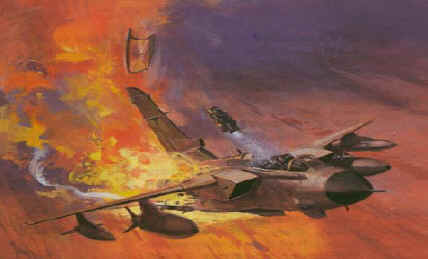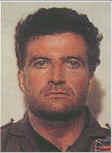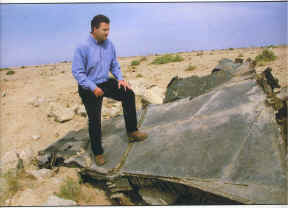The flight that changed my life!
At the end of May in 1980 I made the first real decision of my life; I had had enough of academia and decided to leave school that summer after my 0 levels. A few months later I headed to Newcastle to be interviewed for a job as a technician. I didn't make the grade and found myself wandering dejectedly around the City streets. As I pondered my future, wondering if leaving school had been such a good idea, I passed a Royal Air Force careers office. The window was full of glossy brochures promising a world of adventure. Though I wasn't interested in the military I thought that reading one of the brochures would kill some time as I waited for my bus. If leaving school had been my first real decision walking into that office was to be the most momentous. Three hours later I had signed on a dotted line and was a member of Her Majesty's Armed Forces.
 Even then I had no idea what Her Majesty had lined up for me. This was the height of the Cold War, we never really believed we would ever fire a missile or drop a bomb in anger. As a young officer I found myself at the controls of a nuclear bomber; if I ever went to war there would be nothing to come home to. There were a million of us staring over the Iron Curtain at five million of them. Watching and waiting, knowing that whenever the siren sounded it was always going to be an exercise. It could never be for real.
Even then I had no idea what Her Majesty had lined up for me. This was the height of the Cold War, we never really believed we would ever fire a missile or drop a bomb in anger. As a young officer I found myself at the controls of a nuclear bomber; if I ever went to war there would be nothing to come home to. There were a million of us staring over the Iron Curtain at five million of them. Watching and waiting, knowing that whenever the siren sounded it was always going to be an exercise. It could never be for real.

But then Saddam Hussein, who had once been our friend and customer, invaded Kuwait and what we never believed would happen in Europe was about to set off three thousand mile away in the desert.
I have vivid memories of the day it all started: I was at an airshow in Cornwall. It was the usual routine, pose around for a while, chat up some of the local talent, have a few quiet drinks and then follow them up with a few extremely loud drinks. Round off the evening with the hottest curry you can find. Except this time it was different. The sirens screamed for real, we wore called to thirty minutes readiness to go to the Gulf. Half an hour to go to war.
In true military fashion it was a case of "hurry up and wait". Order and counter-order fizzled and flew, culminating with everyone retiring to the bar, exhausted by the speculation, and standing themselves down. The standing down session went well, by the end of the night not many crews were standing. I remember running around with a beer towel on my head pretending to be an Arab; Simon Burgess, a mate from another squadron, said "Nichol, you'll regret doing that one day. The next time I saw him we were being dragged out of the ruins of an Iraqi interrogation centre after being used as human shields.
By January 1991 the diplomats had had their chance. The talking was finished. Desert Storm left the hands of the politicians and became the practical business of the military. It was time for 'the mother of all battles' to begin.
How did it feel? Electrifying. As General Schwarzkopf put it, we were going to be the Thunder and Lightning of Desert Storm. But at the same time there was a real sense of trepidation. The fear of going into the unknown. After we were given the details of our mission I felt physically sick, I was almost paralysed with a mixture of fear and elation.
As John Peters (my pilot), or JP as he was known, walked out to our Tornado we passed some of the other guys returning from the first raids. Paddy, my friend and squadron mentor, lit a cigarette with shaking hands. "You should have seen the fucking target," he said, "it was lit up light like a fucking Christmas tree, flak everywhere. Tubes of molten fucking metal." We stopped in our tracks and stared at him. "But don't worry," he went on with a grin, "you'll be OK."

At eight thirty in the morning we took the last few drops of fuel from our airborne tanker and dropped towards the Iraqi border. It was a gin-clear sky. 'Burning blue'. Suddenly we were on our own, one aircraft in the vastness of Iraq's southern desert. For ten years I had taken The Queen's shilling, now she was expecting some return on her investment.
We crossed a major north-south highway teeming with military vehicles, a vast convoy of men and weaponry stretching as far as the eye could see. This was our first real sighting of the enemy and as their faces jerked skywards in alarm I had another rush of fear, this was all for real.
Down there are several thousand men dedicated to the terminally simple idea of killing me. The few words of banter dry up and we press on in silence. Lower and faster. The speed is up to about 60OMPH and JP forces the jet down to 50 feet as it bounces hard in the low-air turbulence. As we close on the target adrenaline is pumped around my body, I'm back in the groove. This is just another mission, I've flown this attack profile hundreds of times. I'm going to succeed, I won't screw up; in an hour I'll be back home.
The mechanics of throwing eight thousand pounds of high explosive into the enemy's back garden are in place. Our timing is spot on, the target is identified and the computer can take over. Then they start shooting. At us. Heavy flak starts coming up, lazy curving arcs of tracer, dozens of sparkling lights. Paddy was right; it looks like Christmas. But this is not the season of goodwill.
The shells burst and chunks of explosive metal blossom out in all directions. The jet bucks under the onslaught. It's not meant to be like this.
Ten seconds from weapon release. There's a fully developed barrage of flak in front of us. We're about to fly into a cauldron of fire. JP's happy with the weapon system, I've got our defensive aids working overtime. "Weapons armed, happy to commit." The target is in the sights. "Three, two, one, NOW."
You don't just 'drop' the bombs from a Tornado. It lets them go when it is convinced that you are convinced that all of the conditions are correct. Our Tornado isn't convinced and it remains unconvinced. The bombs don't release, chaos in the cockpit, warning lights, sirens, we're high over the target area, we're slow. JP is shouting at me.
He will never know what went wrong. I will never know.
But what I do know is that a computer, operated by me, did not function as it should have done at the most acute moment of need I have ever experienced. Ten years of training and preparation ended in abject failure.
Maybe it was the computer's fault. Probably it was mine. As the flak poured into our jet we were beating ourselves hard with the idea of what people were going to say about our efforts. As it turned out, concern for our reputations was the very least of the things we had to worry about. We were beating a hasty retreat to the border when WHUMPH, a heat seeking missile took us out.
It was like being hit by an express train, one minute I was flying at 50 feet looking up at bright blue sky then bang, the jet was tumbling like a sycamore leaf and instead of blue sky I was looking up at brown sand. I presume that it was the sand that was brown.
The jet rights itself for a second. We're on fire, the fly by wire system is down, our live ammunition is cooking off, flames are rushing along the spine of the jet towards me. Eject! Eject! Eject!
Ejecting from a Tornado is an interesting experience. You pull on the black and yellow handle and there is a tiny delay - no longer than seven or eight lifetimes - while nothing happens. Then technology takes over. Rockets fire, perspex explodes and straps tighten. You're propelled upwards under I8 times the force of gravity. You accelerate from zero to 20OMPH in just under a second.
It's like being grabbed by a giant and tossed into the centre of a hurricane. You go through flames and explosions, past confusion, noise and fear. Suddenly the parachute opens with a crack and there's only silence. You open your eyes. The desert is rushing up to meet you. You hit the sand and collapse in a heap. In enemy territory.
I was no longer a modern day knight on a high-tech charger, I was a very small, very scared, insignificant human being at the feet of one of the most corrupt, evil and cruel regimes in the world. We were about to find out how cruel.
Within hours we were captured by some of the troops from the airbase our mates had just bombed; they were not best pleased to see us. As they beat us to the ground with fists, boots and rifle butts AK47s were cocked and I realised I was going to die. At one point a soldier held a pistol against my head, in broken English he told me he was going to kill me. The realisation that death was imminent was remarkably calming; nothing I could do or say would change the next few seconds. He pulled the trigger and the hammer thumped against an empty barrel. It sounds trite now but at the time I thought, "What a fun few weeks this is going to be."
They wanted information out of us and we didn't want to give it up, the Geneva Convention states quite clearly that POWs are not obliged to answer any questions bar number, rank, name, date of birth. Sadly the Iraqis had lost their copy of the book, they proceeded to question us the only way they knew how, with extreme violence. The strange thing was that I knew I would give up at some point, I couldn't hold out forever, but I didn't want to give any information for no return. I had to have it beaten out of me; I didn't want to appear weak.
Over the following three days the interrogation took many forms; sleep deprivation and being stuck in stress positions for hours on end. To stand with your feet a meter away from a wall with your forehead pressed against the plaster doesn't sound too bad, but within minutes neck and leg muscles are in spasm. Try it for an hour knowing that someone is poised over you with a rifle butt if you move. I was beaten by a group of guards with fists and boots, chained to a chair and beaten with rubber hoses. At one point a guard was stubbing his cigarette out on my ear.
The worst part? Not so much the pain as the fear and expectation of what was to come. Pain hurts but there is a strange comfort in it because you know where you stand. The hard part comes when you're left alone in darkness to listen to others being tortured and to contemplate your immediate future. I knew I would crack, I just didn't know when. More importantly my only thought was, "What will they do to me, to make me give in?"
After a few days of the gentle stuff they brought on their big players. In the midst of a severe kicking a bloke stuffed tissue paper down the back of my neck and then lit it. This is enough, ask me another question, I'm yours, I've given in. The ludicrous part was that they didn't know what they wanted to find out. They would ask stupid questions about the weight of the Tornado or how fast it could fly; stuff any kid with a copy of an aircraft magazine would know. Had it been worth holding out for three days?
Of course it had; it satisfied my sense of personal pride not to have given in without a fight. But still the feelings of guilt and shame were enormous, I felt like a total failure. Not only had I failed in my mission, I'd been shot down, captured and broken under interrogation. To compound it all I was about to be paraded on the world's TV screens so that everyone would know what a failure I really was.
With an AK47 assault rifle pointed squarely at my head I was forced in front of the camera. I was determined to sit straight and proud, I repeated the Iraqi's words to the letter, hoping that the dreadful grammar would show that I was under duress. Then they threw me, chained and blindfolded back into the cell. As I lay on the freezing floor the enormity of my situation came home to me, what would my parents say when they saw the TV footage, how were they going to cope. The emotions overwhelmed me in a torrent and tears railed, through the blindfold, down my face and dripped onto the concrete floor.
The emotions faded into the background as I began to exist as a POW. The next seven weeks were punctuated by isolation, fear, boredom and beatings. A bit of bombing by our Allies resulting in a few more brushes with death. Then, in the same surreal way it had begun, it was all over. A chap in a fancy suit came into my cell and said, "the war is over, you can go home." Just like that. Within days we were re-united with friends, family and loved ones. Copious beers were drunk, vast curries consumed and old girlfriends came out of the woodwork. The ordeal was over and life could get back to normal, except that the rest of my life was just beginning. There was no great change for me; I had faced death and survived, yes I valued life more, in some ways I was a calmer person but seven weeks of unpleasantness doesn't change a lifetime, not in the way you might think.
Within weeks I was flying again and a year later the call up to Bosnia came. I wanted to go; not to prove myself but because the family atmosphere of Squadron life means that you don't want to be the one left at home. My first flight back in combat caused many emotions to re-surface. I think I was more scared than the rest of the boys because I had already seen death at close range; I knew I wasn't immortal. But I was also glad to be back in the groove; to know I could still hack it.
The TV pictures that I thought signified failure propelled me into the public eye, people were desperate to know the story. The obvious answer was a book and Tornado Down was born, then a follow up, Team Tornado, and now the novels.
Why did I leave the RAF? I was disenchanted and disillusioned; we were trying to do too much with too little. I left after I5 years service because I felt that the extraordinary efforts of those at the bottom of the pile were being brushed aside by some senior officers and politicians in the ivory towers of The Ministry of Defence. Morale was at an all time low; when the RAF asked for 3000 volunteers to leave on redundancy 7500 of us put our hands in the air. I was one of the chosen few.
I still miss some of the camaraderie, nothing can replace the family atmosphere of a fighter squadron crewroom. I regularly play golf with friends who are still in the RAF; their accounts of parties and daring-do can still raise a pang of jealousy. The rest of it? I'm glad I got out when I did, indeed most colleagues from my era privately admit that they will leave the RAF at the first opportunity.
The ordeal didn't change me as a person but it changed my life; I suppose in some ways I have been lucky. I'm now a writer, sometime TV presenter and an after dinner speaker because seven years ago a lone Iraqi conscript got lucky with a missile. I also lecture to business on self motivation and coping with change, the question I am most asked is, "How did you cope?" The answer is surprisingly simple, as both John McCarthy and Terry Waite say, "You have no other choice, you have to cope."
A few years ago I was at a book launch party in London, a well known and beautiful actress approached me. "I envy you your ordeal," she said, "I couldn't do it myself but you've been tested in a way few of us can ever imagine, and you survived." I'm not sure that the test was nearly as great as a lot of people imagine but I still look back on those weeks as a POW with an unexplainable fondness and say to myself, "Yeah, I got through it, I did OK."